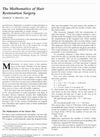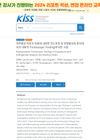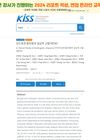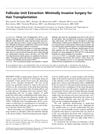 February 1997 in “Dermatologic Surgery”
February 1997 in “Dermatologic Surgery” Math skills are crucial for planning and executing successful hair restoration surgeries.
 April 2019 in “Actas Dermo-Sifiliográficas”
April 2019 in “Actas Dermo-Sifiliográficas” The conclusion is that having both Frontal Fibrosing Alopecia and Discoid Lupus Erythematosus may suggest a shared immune response in certain people, and a mix of antimalarial drugs and 5-alfa-reductase inhibitors is recommended for treatment.
 November 2016 in “대한피부과학회지”
November 2016 in “대한피부과학회지” The document's conclusion cannot be summarized as it is not provided in a language I can understand.
 January 2009 in “대한피부과학회지”
January 2009 in “대한피부과학회지” The conclusion is that more women in their forties are getting AGA and stress is linked to AGA in both men and women.
 581 citations,
October 1998 in “Journal of The American Academy of Dermatology”
581 citations,
October 1998 in “Journal of The American Academy of Dermatology” Finasteride safely and effectively treats male pattern hair loss, but may cause reversible sexual issues and harm male fetuses.
 329 citations,
January 1997 in “Journal of the American Academy of Dermatology”
329 citations,
January 1997 in “Journal of the American Academy of Dermatology” Frontal fibrosing alopecia is a hair loss condition in postmenopausal women, similar to lichen planopilaris, with ineffective treatments.
 153 citations,
August 2002 in “Dermatologic Surgery”
153 citations,
August 2002 in “Dermatologic Surgery” Follicular Unit Extraction (FUE) is a less invasive hair transplant method with minimal scarring, suitable for about 60% of patients, especially those needing fewer grafts and quicker recovery.
 120 citations,
October 2004 in “International journal of radiation oncology, biology, physics”
120 citations,
October 2004 in “International journal of radiation oncology, biology, physics” Higher doses of cranial irradiation are linked to permanent hair loss.
 107 citations,
December 2013 in “International Journal of Dermatology”
107 citations,
December 2013 in “International Journal of Dermatology” The document concludes that hair is complex, with a detailed growth cycle, structure, and clinical importance, affecting various scientific and medical fields.
 97 citations,
September 2006 in “Pharmaceutical Research”
97 citations,
September 2006 in “Pharmaceutical Research” No treatment fully prevents hair loss from chemotherapy yet.










